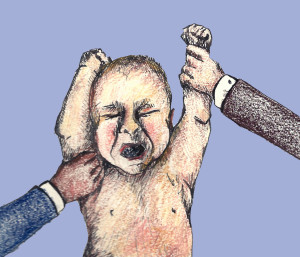Orphans in the Crossfire
On the surface, the main news story pertaining to U.S.-Russian relations over the past few months has been Russia’s stomach-turning anti-American adoption law that would bar Americans from adopting Russian children. Americans adopt thousands of Russian children each year, many of whom have disabilities and would otherwise suffer in Russia’s Dickensian orphanages. The law’s populist proponents, allies of President Vladimir Putin, have long contended that Russian children in American adoptive homes have been subject to abuse. They cite a few factual cases of child abuse, including one six-year-old molested by his adoptive parents and another child who was sent back to Russia with nothing more than a note. Tragic as these cases certainly are, the idea that they are particular to American parents rings hollow, especially because Putin and Co. don’t seem to be making grand pronouncements about child abuse in Russia or pumping funds to improve dilapidated and poorly staffed orphanages. Rather, the method to their madness can be found in the chilling words of one of the ban’s sponsors: It is better for children “to die in Russia than to live in America.”
So what (allegedly) provoked the Kremlin’s burst of nationalistic biopower? Just after Thanksgiving, the U.S. Congress passed the Magnitsky Act, named after Sergei Magnitsky, a corporate lawyer who exposed widespread corruption among Russia’s political and bureaucratic elite. Magnitsky died in police custody in 2009 following his arrest on dubious charges. The act limits Russian officials connected with the Magnitsky Affair from traveling to and doing business with the United States. Congress coupled the Magnitsky Act with the repeal of the Jackson-Vanik amendment, a 1974 provision that restricted U.S. trade with the USSR for not allowing Soviet Jews to emigrate.
Repeal of Jackson-Vanik was required for the U.S. to accept Russian membership in the World Trade Organization. However, eliminating one human rights statute, albeit a defunct one, looks bad without the institution of a new one. The Magnitsky affair offered Congress an easy, good-PR cause célèbre with which to publicly slap Russia on the wrist while benefiting from the improved relationship Russia’s WTO membership would offer. The Cato Institute estimated in 2011 that U.S.-Russia trade could double in only five years as a result of Russian ascendancy.
Congress and the Obama administration likely assumed that the Russians would grin and bear the fairly minor insult of the Magnitsky Act. Accordingly, the adoption ban probably caught them off guard. But as Garry Kasparov wrote in a late January op-ed in the Wall Street Journal, the assumption that Putin would allow some of his close allies to be slapped with trade restrictions and then not respond is preposterous. Despite the Western media’s heart fluttering over upper-middle class demonstrations last year in Moscow (the phrase “Russian Revolution” has never been so trivially employed), Putin maintains strong support in most of the country and has carte blanche for all policy decisions. His punishment of Russian orphans and American adoptive parents hurts those constituencies exclusively, and Putin couldn’t care less about either.
But frankly, beyond the professed outrage from State Department spokeswoman Victoria Nuland and White House Press Secretary Jay Carney, the U.S. government hasn’t exactly pushed Russia on the issue. With the economic recovery still limping along, Obama has chosen to limit human rights criticisms that might jeopardize job-creating measures. Despite his robust labor union support, free trade agreements have actually been a hallmark of the Obama administration, having signed deals with Colombia, Panama, and South Korea. Others are in the works, including an ambitious Pacific trade group that will include Russia. U.S. Trade Representative Ron Kirk, a cabinet-level official, lobbied hard for Russian inclusion in the WTO. Though not confirmed by the White House, both Russian and American media outlets have reported that President Obama will visit Russia at some point in the next year, likely for an economic summit. Lip service will be paid to human rights, but policy makers will be hard at work on matters of realpolitik. Adoption bans make headlines for a week, but trade agreements make money for a lifetime.
